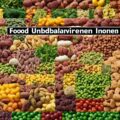Understanding the Turkey Salmonella Alert: Staying Safe and Healthy
Food safety alerts can be concerning, but they also provide an opportunity for us to come together as a community and look out for one another’s wellbeing. The recent turkey salmonella alert is no exception. While it’s important to be aware of potential risks, it’s equally crucial to approach this situation with a calm and compassionate mindset. Let’s explore what this alert means, how we can protect ourselves and our loved ones, and how we can use this as a chance to foster a culture of care and support.
What Is Salmonella and Why Should We Be Aware?
Salmonella is a type of bacteria that can cause foodborne illness. When ingested, it can lead to symptoms such as fever, diarrhea, and abdominal cramps. While most people recover without treatment, it can be more serious for young children, older adults, and those with weakened immune systems. The current alert regarding turkey products reminds us of the importance of food safety practices in our daily lives.
However, it’s essential to remember that this alert isn’t cause for panic. Instead, it’s an opportunity for us to become more mindful of our food preparation habits and to support those who might be more vulnerable in our communities.
Practical Steps for Safe Food Handling
Ensuring food safety doesn’t have to be complicated. By incorporating a few simple practices into our routines, we can significantly reduce the risk of foodborne illnesses. Here are some compassionate ways to approach food safety:
- Wash hands thoroughly: This simple act is a gesture of care for ourselves and others.
- Cook turkey products thoroughly: Ensure the internal temperature reaches 165°F (74°C).
- Avoid cross-contamination: Use separate cutting boards and utensils for raw meats and other foods.
- Store foods properly: Refrigerate or freeze leftovers promptly.
Remember, these practices aren’t just about following rules – they’re about showing love and consideration for those we cook for and share meals with.
Supporting Our Community During Food Safety Alerts
Food safety alerts can be particularly challenging for certain members of our community. This is an excellent opportunity to reach out and offer support:
- Check on elderly neighbors or relatives who might need assistance with grocery shopping or meal preparation.
- Share accurate information about the alert and safe food handling practices with friends and family.
- If you know someone who’s been affected by foodborne illness, offer your support and help during their recovery.
By approaching this situation with empathy and a willingness to help, we can turn a potentially stressful event into an opportunity for community bonding.
Nurturing a Positive Relationship with Food
While it’s important to be cautious, it’s equally crucial not to let food safety concerns overshadow the joy and nourishment that food brings to our lives. Here are some ways to maintain a positive relationship with food:
- Practice mindful eating, savoring each bite and appreciating the effort that went into preparing the meal.
- Use this as an opportunity to explore new recipes or cooking methods that align with food safety recommendations.
- Share meals with loved ones, fostering connections and creating positive memories around food.
Remember, food is not just about sustenance – it’s about culture, connection, and care.
Moving Forward with Awareness and Compassion
As we navigate this turkey salmonella alert, let’s focus on the positive actions we can take. By staying informed, practicing safe food handling, and supporting one another, we can emerge from this situation stronger and more connected as a community.
Let’s use this as an opportunity to cultivate gratitude for the food we have, the knowledge to keep ourselves safe, and the ability to care for one another. After all, true wellbeing comes not just from what we eat, but from how we approach life’s challenges with compassion and mindfulness.
Frequently Asked Questions About the Turkey Salmonella Alert
1. How can I tell if the turkey I bought is affected by the salmonella alert?
Check the packaging for specific product codes or dates mentioned in the alert. If you’re unsure, contact the store where you purchased the turkey or the manufacturer directly. Remember, it’s always better to err on the side of caution when it comes to food safety.
2. What should I do if I’ve already consumed turkey that might be affected?
If you’re not experiencing any symptoms, there’s no need to panic. Monitor your health for signs of illness like fever, diarrhea, or abdominal cramps. If symptoms occur, stay hydrated and consult with your healthcare provider, especially if you’re in a high-risk group.
3. Can I still enjoy turkey dishes during this alert?
Absolutely! The key is to handle and cook turkey products safely. Ensure thorough cooking to an internal temperature of 165°F (74°C), practice good hygiene, and avoid cross-contamination. With these precautions, you can continue to enjoy your favorite turkey dishes.
4. How can I support local turkey farmers during this time?
Local farmers often adhere to strict safety standards. Consider purchasing from trusted local sources, farmers’ markets, or through community-supported agriculture programs. Engage with farmers to learn about their safety practices and show your support for their efforts.
5. What are some alternatives to turkey that I can try?
This could be a great opportunity to explore new protein sources or vegetarian options. Consider dishes with chicken, fish, legumes, or plant-based proteins. Remember, variety in our diet not only ensures nutrition but can also be an exciting culinary adventure!









